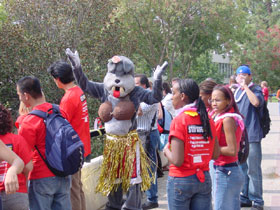Jan and Bud Richter Center
Module Seven: Professional Growth
In this Video: How Does This Impact My Professional Growth? With Ellen Junn, Ph.D., prior Associate Provost; Helda Pinzon-Perez, Ph.D., Professor, Department of Public Health

Effective teaching and service are two of the three components of retention, tenure and promotion requirements. By utilizing the resources available in this website, a faculty member can use service-learning activities to positively impact students, the campus, and community while simultaneously meeting their tenure and/or promotion requirements. The demands placed on faculty can often appear overwhelming. Incorporating service-learning practices can provide an efficient means of meeting multiple professional development goals concurrently.
A cultural shift may be necessary in some departments to support service-learning across the curriculum. However, numerous Fresno State faculty members are implementing service-learning techniques and publishing their findings. Many have been able to secure funding to support their service-learning activities. This occurs across disciplines including those in business, arts and humanities, science, engineering, social studies, agricultural and more.
Consider the following examples for meeting your probationary or promotion needs.
- Action Research: Service-learning is inherently conducive to action research and gives students experience in conducting research in the field.
- Grant and Foundations: Pilot projects set in a high need setting can open up many opportunities for donor, foundation, or grant support. Contact the Office of Research and Sponsored Programs for more information on this topic.
- Teaching Effectiveness: Research is replete with examples of how experiential learning enhances the learner’s experience. Subsequently, practitioners of service-learning often enjoy higher teaching evaluation scores. Moreover, students retain more when they are engaged and take ownership of their learning.
- Community Service: Most probationary plans include a service component. In regional universities, such as Fresno State, faculty are encouraged to apply their professional expertise to meeting community needs. This can include, but is not limited to, serving on nonprofit boards, conducting training programs, engaging in research that directly benefits a community organization, and/or offering other pro bono services. Service-learning readily lends itself to meeting this criterion.
- Collegiality and Collaboration: Service-Learning provides outstanding opportunities for working across disciplines which create unique opportunities for collaboration and improved outcomes. Problems facing our Valley require a multi-disciplinary approach. Faculty will find collaboration with colleagues, not only more effective in meeting professional goals, but truly a highlight of university work.